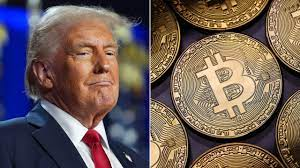$BTC Bitcoin transcends political divides - it is neither red nor blue, just code.
And yet, the media stubbornly portrays it as a partisan conflict, ignoring the bipartisan support it receives.
Leaders from both sides support it, so why the distorted story? Watching a recent CBS segment on #Bitcoin , I was frustrated again.
The focus has been solely on Trump and cryptocurrencies, with no mention of what Bitcoin actually is - a decentralized, borderless system built on blockchain.
Most people struggle to understand this technology, and I get it; even after years of deep research, I still learn daily. But one thing is clear:

Bitcoin is not a political football. In today's polarized America, few issues bridge the partisan divide, but Bitcoin does.
The media, however, loves to present it as a battleground - either a right-wing rebellion or a progressive effort for financial inclusion. The truth?
Bitcoin is neutral. It is software that doesn’t care about your politics, wealth, or beliefs.
It is a tool for everyone, offering a monetary network free from centralized control.
This disruption of traditional finance makes it a target for ideological manipulation.
Look at the evidence: Republican Senator Cynthia Lummis advocates for Bitcoin as a hedge against inflation and a defender of personal freedom.
In the meantime, Democrat Kirsten Gillibrand sees it as a driver of innovation and privacy.
Together, they co-sponsored the Genius Act, which was signed in July with significant bipartisan support, solidifying America’s stake in this new asset class.
This is not just a story. From state houses to city halls, lawmakers across the spectrum are pushing pro-Bitcoin policies - tax clarity, innovation hubs, and more.
They recognize its potential to empower individuals and maintain the competitiveness of the US in the digital economy.
Yet, the media insists on a divisive narrative, portraying Bitcoin as a prop in culture wars - sometimes as a symbol of anti-government sentiment, sometimes as a techno-utopian dream.
In reality, it is neither; it is a neutral protocol, like the internet in the '90s, ready to reshape global finance.
This framing is not just misleading - it is harmful.
If we allow Bitcoin to be reduced to a partisan wedge, we miss its transformative power.
It is a rare point of common language that both sides value for different reasons, but with shared goals: innovation, freedom, and progress.
Let's get rid of the media narrative and start a real conversation about what Bitcoin means for all of us, not just for one party.

